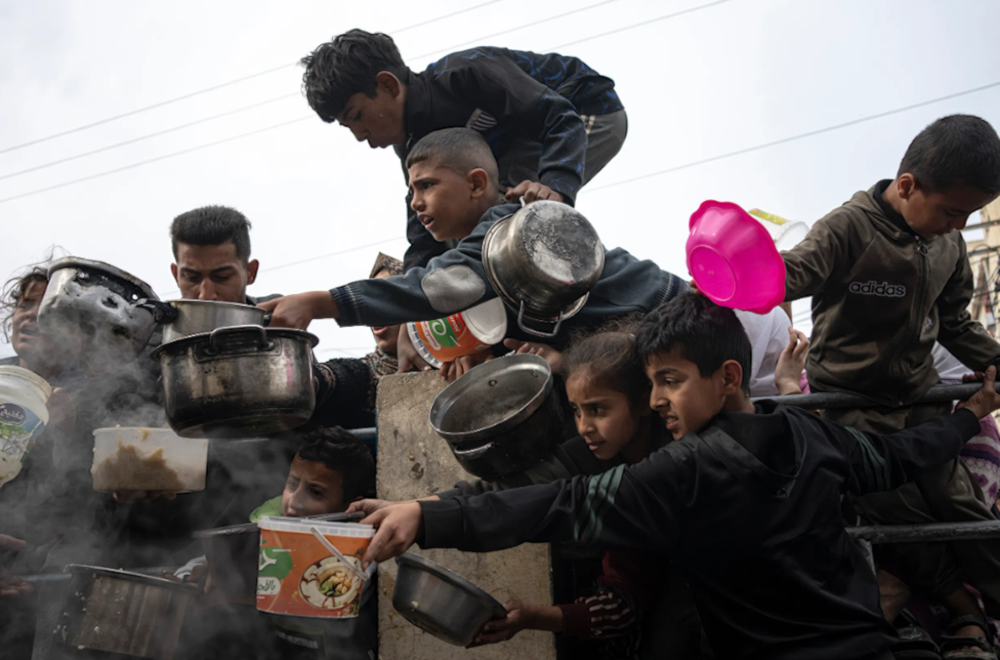At least 65,000 Gaza children hospitalized due to severe malnutrition
Gaza officials accuse "Israel" of using starvation as a weapon of war, warning that over 65,000 children now face severe malnutrition amid a devastating aid blockade.
-

Children in Gaza line up waiting to receive food (AP)
The Government Media Office (GMO) in Gaza on Monday accused "Israel" of deepening the suffering of Palestinian children through genocide and a continued blockade, which has resulted in severe malnutrition among over 65,000 children from a total of 1.1 million facing daily hunger.
“Israel uses starvation and deprivation as a systematic weapon of war against civilians, in flagrant violation of international humanitarian law,” stated the GMO, adding that the blockade and closed crossings have caused a “catastrophic deterioration” in public health, especially affecting children and infants.
Palestinian officials placed full responsibility on "Israel" “for the worsening humanitarian catastrophe” and also condemned the international community and its institutions for remaining silent and failing to hold "Israel" accountable for its “brutal and continuous violations.”
The GMO called for international legal action against “Israeli war criminals” for the use of “starvation and deprivation as a weapon of genocide” and expressed support for the International Court of Justice’s ruling that "Israel’s" actions violate international law and Palestinian rights.
It stressed the urgent need to reopen all crossings to allow “the entry of humanitarian aid, food, medical supplements and medication, especially for children and the sick.”
The blockade since March 2 has been described by human rights groups and international reports as collective punishment and a violation of international law.
The blockade
On March 2, 2025, "Israel" initiated a comprehensive blockade on the Gaza Strip, halting all humanitarian aid deliveries through key crossings, including Rafah, Beit Hanoun, and Karem Abu Salem.
This action followed the expiration of the first phase of a ceasefire agreement and was intended to force Hamas into accepting a new ceasefire proposal, reneging on the original deal reached. The blockade has led to severe shortages of food, fuel, and medical supplies, exacerbating the humanitarian crisis in Gaza.
As of April 25, 2025, the United Nations World Food Program reported that its food supplies in Gaza had been depleted due to the ongoing blockade. Approximately 80% of Gaza's over 2 million residents rely on humanitarian aid, and markets face extreme shortages with soaring prices, rendering essentials unaffordable.
The blockade has been condemned by rights groups as a potential war crime. Malnutrition is escalating rapidly, with the UN reporting that 3,700 children are suffering acute malnutrition in March, an 80% increase from the previous month
WFP has fully depleted its food stocks in #Gaza.
— World Food Programme (@WFP) April 25, 2025
Today, the last supplies were delivered to hot meal kitchens — Gaza’s only steady source of food for weeks. These kitchens will run out of ingredients in the coming days.
Read full statement.🔗https://t.co/OQCpJQcMfg pic.twitter.com/QaXY5CsbHx
ICJ to begin hearings
Al Mayadeen reported yesterday that the International Court of Justice (ICJ) will begin a week of hearings on Monday to examine "Israel's" humanitarian responsibilities in Gaza, which has faced a full blockade and halted aid for over 50 days.
The hearings in the Hague will open with a submission from the Palestinian side, followed by arguments from 38 states, including the US, China, Russia, France, and Saudi Arabia, as well as representatives from the Arab League, Organisation of Islamic Cooperation, and African Union.
The proceedings follow a UN General Assembly resolution asking the ICJ for an advisory opinion on the legal consequences of "Israel’s" occupation of Palestinian territories, with a focus on its obligations under international law to allow humanitarian aid.
The UN and rights groups warn that "Israel’s" continued blockade—completely cutting off aid since March 2—has pushed Gaza’s 2.4 million residents into a deepening humanitarian crisis, with growing fears of famine.

 4 Min Read
4 Min Read








